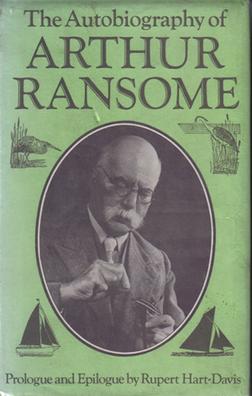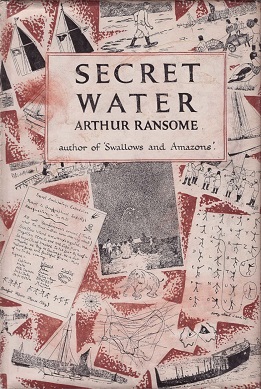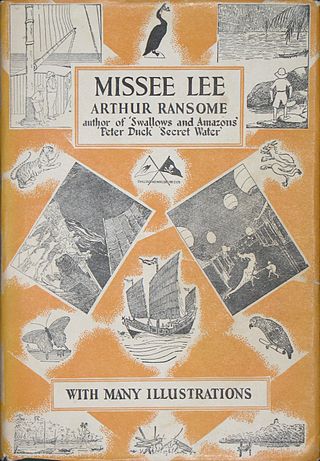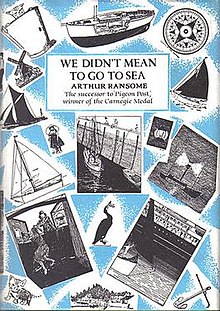
Arthur Michell Ransome was an English author and journalist. He is best known for writing and illustrating the Swallows and Amazons series of children's books about the school-holiday adventures of children, mostly in the Lake District and the Norfolk Broads. The entire series remains in print, and Swallows and Amazons is the basis for a tourist industry around Windermere and Coniston Water, the two lakes Ransome adapted as his fictional North Country lake.

The Swallows and Amazons series is a series of twelve children's adventure novels by English author Arthur Ransome. Set in the interwar period, the novels involve group adventures by children, mainly in the school holidays and mainly in England. They revolve around outdoor activities, especially sailing. Literary critic Peter Hunt believes it "changed British literature, affected a whole generation's view of holidays, helped to create the national image of the English Lake District and added Arthur Ransome's name to the select list of classic British children's authors." The series remains popular and inspires visits to the Lake District and Norfolk Broads, where many of the books are set.

Nancy Blackett is a 28-foot (8.5 m), 7-ton, Bermuda rigged sailing cutter built in 1931. The boat is now owned and operated by The Nancy Blackett Trust.

Peter Duck is the third book in the Swallows and Amazons series by Arthur Ransome. The Swallows and Amazons sail to Crab Island with Captain Flint and Peter Duck, an old sailor, to recover buried treasure. During the voyage the Wildcat is chased by another vessel, the Viper, whose piratical crew are also intending to recover the treasure.

Winter Holiday is the fourth novel of Arthur Ransome's Swallows and Amazons series of children's books. It was published in 1933. In this story, the third set of major characters in the series, the Ds — Dick and Dorothea Callum—are introduced. The series' usual emphasis on boats and sailing is largely absent, as the story is set in the winter. Instead, the children's activities focus on ice skating, signalling with semaphore and Morse code, and sledging.

Great Northern? is the twelfth and final completed book of Arthur Ransome's Swallows and Amazons series of children's books. It was published in 1947. In this book, the three families of major characters in the series, the Swallows, the Amazons and the Ds, are all reunited in a book for the first time since Pigeon Post. This book is set in the Outer Hebrides and the two familiar Ransome themes of sailing and ornithology come to the fore.

Swallowdale is a children's adventure novel by English author Arthur Ransome and first published by Jonathan Cape in 1931. The book features Walker siblings and Blackett sisters, camping in the hills and moorland country around a lake, with Maria Turner, the Blacketts' Great Aunt, acting as an antagonist. It is the second book in the Swallows and Amazons series; preceded by Swallows and Amazons and followed by Peter Duck.

Pigeon Post is an English children's adventure novel by Arthur Ransome, published by Jonathan Cape in 1936. It was the sixth of twelve books Ransome completed in the Swallows and Amazons series. He won the inaugural Carnegie Medal from the Library Association, recognising it as the year's best children's book by a British subject.

Swallows and Amazons is a children's adventure novel by English author Arthur Ransome first published on 21 July 1930 by Jonathan Cape. Set in the summer of 1929 in the Lake District, the book introduces the main characters of John, Susan, Titty and Roger Walker (Swallows); as well as their mother, Mary; and their baby sister, Bridget. We also meet Nancy and Peggy Blackett (Amazons); their uncle Jim, commonly referred to as Captain Flint; and their widowed mother, Molly Blackett. It is the first book in the Swallows and Amazons series, followed by Swallowdale.

Secret Water is the eighth book in Arthur Ransome's Swallows and Amazons series of children's books. It was published on 28 November 1939.

The Picts and the Martyrs is the eleventh book in Arthur Ransome's Swallows and Amazons series of children's books. It was published in 1943. This is the last completed book set in the Lake District and features the Blackett sisters, the Amazons and the Callum siblings, Dick and Dorothea, known as the Ds. Ransome's most native character, the Great Aunt also features prominently as do many aspects of Lakeland life. The Dog's Home is based on a small stone hut built in the woods above Coniston Water close to Ransome's then residence.

Missee Lee is the tenth book of Arthur Ransome's Swallows and Amazons series of children's books, set in 1930s China. The Swallows and Amazons are on a round-the-world trip with Captain Flint aboard the schooner Wild Cat. After the Wild Cat sinks, they escape in the boats Swallow and Amazon, but are separated in a storm. Both dinghies eventually end up in the lair of the Three Island pirates—Chang, Woo and Lee—where they are held prisoner by the unusual Missee Lee, the leader of the Three Island pirates.
Nancy Blackett is a fictional character in nine of the twelve juvenile novels in Arthur Ransome's Swallows and Amazons series of books. She acts as captain of the dinghy, Amazon and usually directing her friends in their various adventures. Nancy apparently has no real-world counterpart as an inspirational source for Ransome but appears to be completely the author's creation. Nancy is sometimes critically viewed as a subversive character for girl readers. The character appeared in a 1963 BBC television adaptation of Swallows and Amazons as well as in the 1974 and 2016 film adaptations of the book.

Pin Mill is a hamlet on the south bank of the tidal River Orwell, on the outskirts of the village of Chelmondiston, on the Shotley peninsula in southern Suffolk. It lies within the Suffolk Coast and Heaths Area of Outstanding Natural Beauty and is a designated Conservation Area. It is now generally known for the historic Butt and Oyster public house, and for sailing.
Racundra's First Cruise is the first book about sailing written by Arthur Ransome, author of the Swallows and Amazons series. It describes a trip he made across the Baltic Sea from Riga in Latvia to Helsinki in Finland and back in a 9 metre sailing boat that he had built.

Swallows and Amazons is a 1974 British film adaption of the 1930 novel of the same name by Arthur Ransome. The film, which was directed by Claude Whatham and produced by Richard Pilbrow, starred Virginia McKenna and Ronald Fraser, with Zanna Hamilton. Its budget was provided by Nat Cohen of EMI Films who had funded the successful 1970 film The Railway Children.
Swallows and Amazons is a 1963 BBC children's television series based on the 1930 novel of the same name by Arthur Ransome, about the holiday adventures of two groups of children, the Swallows (Walkers) and the Amazons (Blacketts), sailing on a lake and camping on an island in the Lake District in the 1930s.

Swallows and Amazons is a 2016 British family adventure film directed by Philippa Lowthorpe and written by Andrea Gibb, based on Arthur Ransome's 1930 children's novel of the same name. The film stars Andrew Scott, Rafe Spall, Kelly Macdonald, Jessica Hynes, and Harry Enfield. Principal photography began on 21 June 2015 in the Lake District. The film, which was released on 19 August 2016, is the third audiovisual adaption of the novel; the first being a 6-part BBC TV series in 1963 and the second a 1974 film version.















